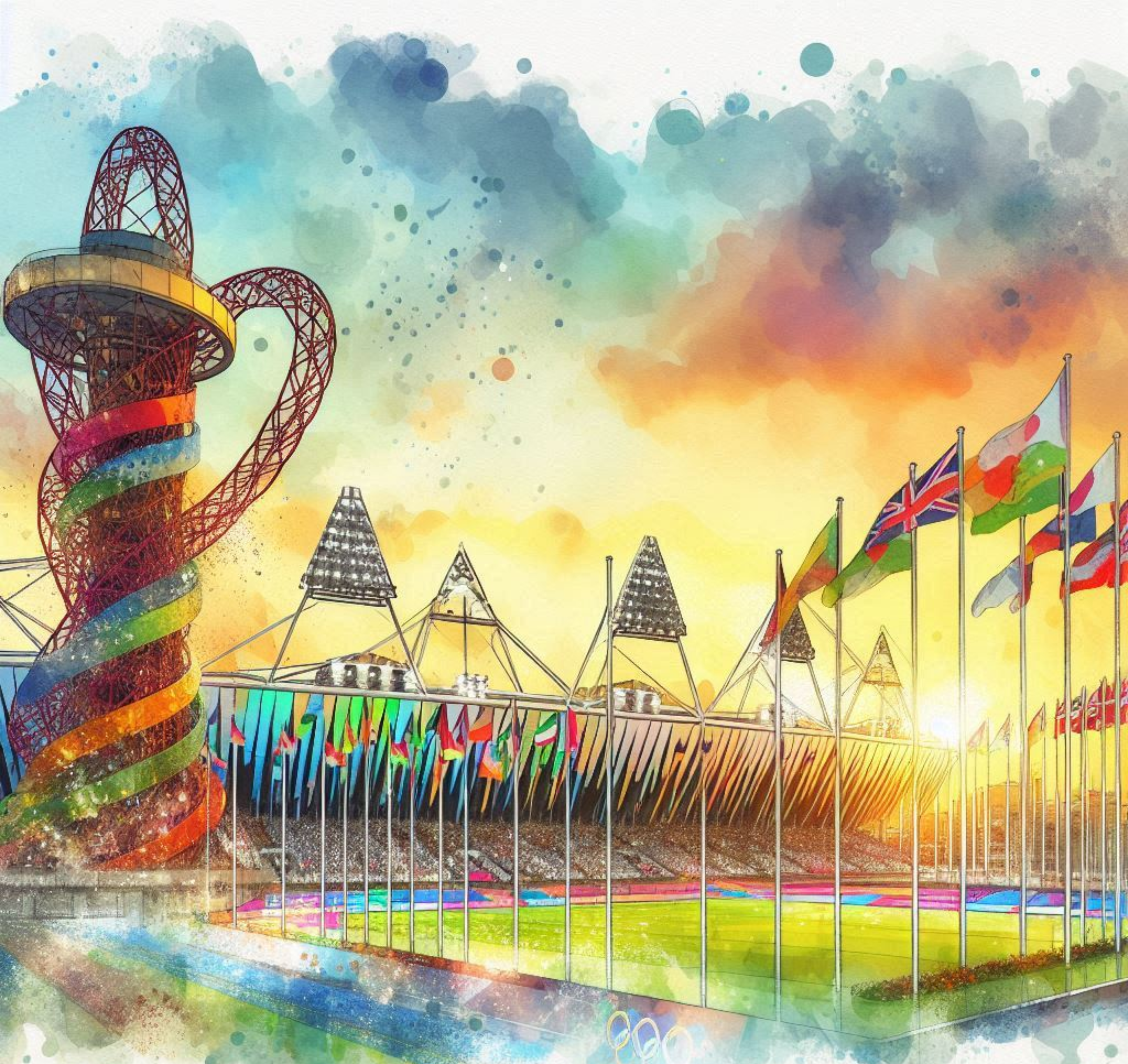In part 2 of 2 Olympic-themed Not-So-Romantic Blogs, we look at the start of the Modern Olympic games in 1896.
Before you read this blog, why not go and learn about the Ancient Olympic Games in part 1 by clicking here.
Table of Contents
The games are back in town!
Since the decline and eventual end of the Ancient Olympic Games there was a handful of other events which used the term “Olympics” including some in Britain and there had been a growing interest in reviving the games in Greece after their war of independence in 1821.
The Zappas Olympics – named after their sponsor Evangelis Zappas- saw the first revival of the Olympic games taking place in Athens in 1859, 1870 and 1875. These games would go on to inspire the International Olympic Committee (IOC) when they bought the games back “officially” in 1896. The 1870 games included a three-month training programme for competing athletes.
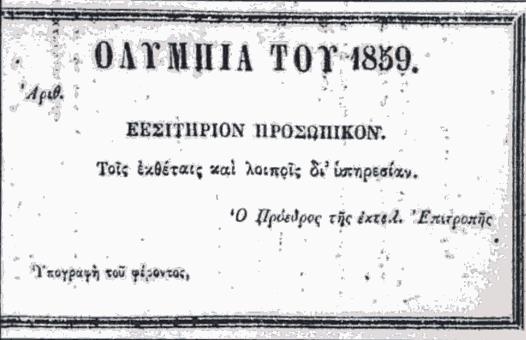
The Zappas Olympics didn’t restore the Olympiad (a period of four years) which all the Ancient Games had had and, although Evangelis wanted to do so, he died in 1865. These Olympics were very much a national to Greece and not the international event we know the Olympics to be today. The role of the Zappas Olympics should not be underestimated in bringing the Olympics back to life.
The IOC was founded by Pierre de Coubertin from France to oversee the Summer Olympic Games, Youth Olympic Games and the Winter Olympic Games (1924).
Rebirth- 1896 Olympic games
The first modern international games under the control of the IOC took place in Athens in 1896. There we 14 nations, 241 athletes and 43 events. Winners of events won themselves a silver medal and runners-up won a copper medal. The first Olympic champion in almost 1500 years went to American James Brendan Connolly who won the triple jump event. The 1896 Olympics also saw the return of the Olympiad which is why these are the first official modern Olympic games.
The games in Paris in 2024 are the 33rd Olympiad.
In 1896, the 43 events were made up of 12 athletic, 6 cycling, 3 fencing, 8 gymnastics, 5 shooting, 4 swimming, 2 tennis, 2 weightlifting and 1 wrestling events -I hope that adds up to 43.
Just like in the ancient games, all the competitors were men with the biggest difference coming in the shape of them not competing naked. This was a fully clothed Olympic game.
The 1896 Olympic Games were a great success.
A falter
The Olympics then fell into one of the worst things you can do. Keeping things pretty much exactly the same. Even the biggest successes needed tweaking and the Olympics stagnated which meant people got bored of it.
The 1900 Paris Olympic games did add a whole range of new sports, Equestrian, more running races, football, archery, golf, polo, rugby union and tug of war among them.
Things sunk lower when the marathon gold medallist at the 1904 Olympic Games was later disqualified when a photo surfaced of him taking a car during the race. Frederick Lorz was his name. As the first games held outside of Europe, very few non-American or Canadian athletes actually went to the games and they weren’t that well attended. The dream of an international Olympic Games faltered.
In an attempt to revive interest, the IOC put on a second Olympic games in Athens in 1906- these are no longer recognised as “official” games but they can be credited with saving interest. They were part of a plan to hole games in Athens in between each of the 4-year Olympic cycle but it never really took off as a series of games.
At any rate, around 850 athletes competed at the 1906 games.
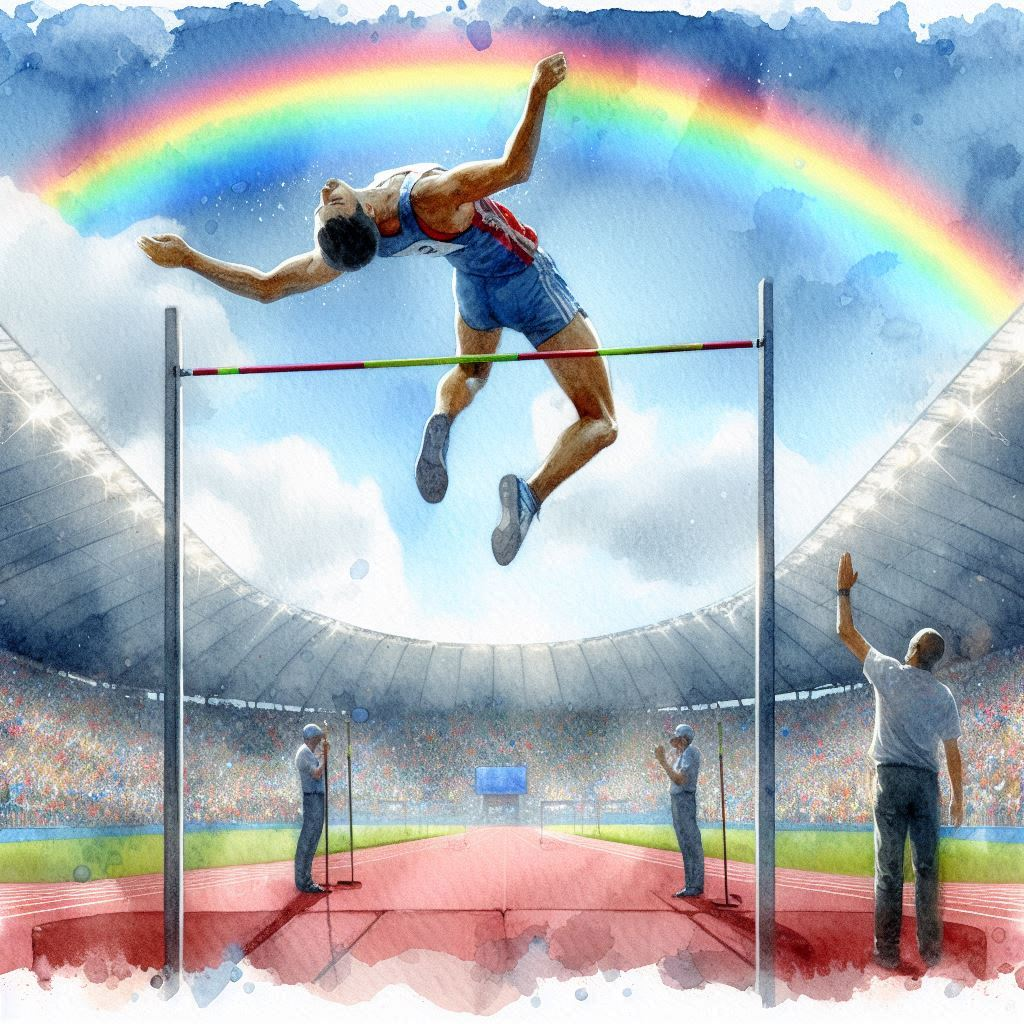
The 1908 London Olympics
The first Olympics to be held in London was in 1908. It was the first Olympic games to feature the Marathon being run to the same length it still is today – 26 miles. The 1908 games were supposed to be hosted in Rome but Mount Vesuvius (yep… the Pompeii destroyer which last erupted in 1944) erupted in 1906 so, quite rightly, Olympic funds were diverted to helping to restore Naples. Because of this, the Olympics came to London.
There were a few other firsts at the 1908 Olympics. The main one came in the shape of the event judges being selected from a range of countries rather than just the host nation. They were also the first to hold more “wintery” events such as figure skating… which took place months after the main Olympic events had finished.
There was 100m running deer shooting- don’t worry this wasn’t actually sending live deer running 100m whilst people shot at them (though that would probably motivate me to run faster) they were deer-shaped targets at different stations.
There was even classic duelling as well – with guns I mean… you know like the cowboys of old.
Sailing, water motorsport and hockey also featured for the first time at the Olympic games. There was also the very first African-American gold medallist when John Taylor was part of the medley relay team.
Going back to the marathon quickly. There was a competitor called Dorando Pietri from Italy. He set off at quite a slow pace before running an incredible second half of the marathon and actually entered the stadium in first place. Sadly, he was so tired he started to run the wrong way so stewards had to turn him around. Dorando fell over five times on his journey to the finish line, each time a steward would help him up. It took him 10 minutes to get to the finish line in the stadium to finish the race in first place.
Second place went to an American whose team all complained to the judges about the help Dorando had received. The complaints were accepted and poor Dorando was disqualified. Queen Alexandria (wife of Edward the 7th) took pity on Dorando and awarded him a silver cup the next day.
Just for your info … the Great Stadium was demolished in 1985.
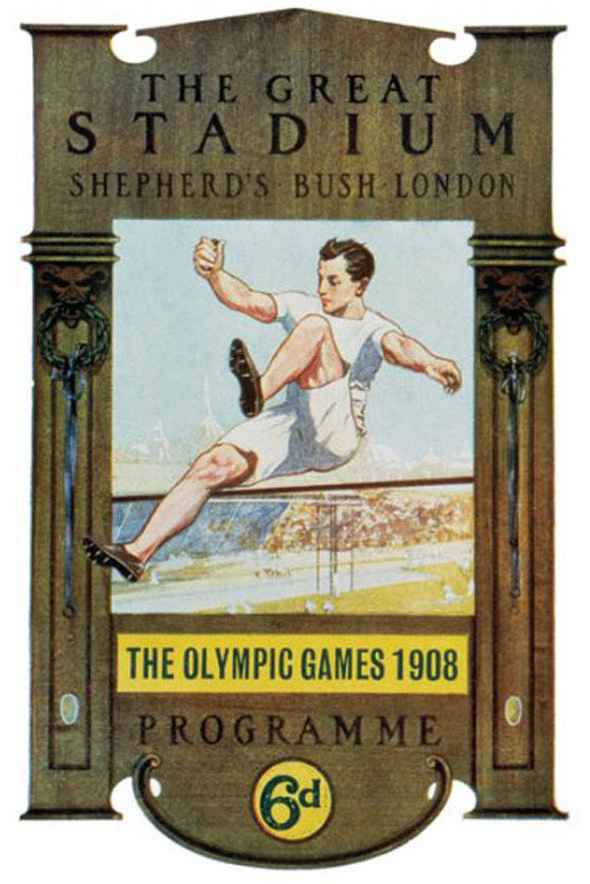
The war years
The games were supposed to be held in Berlin in 1916 but, for fairly obvious reasons (World War 1), they were postponed. And the 1920 games in Belgium were a very muted affair. The 1940 and 1944 games were also cancelled with the games returning to London in 1948 for the first post-war Olympic games- Germany and Japan were both excluded.
Not the war years but the 1936 Olympic Games were held in Berlin and the German government used it as an opportunity to push their ideology on a world stage. I only mention it as 1936 was the first Olympic Games to introduce to torch relay.
And in the same period, the 1932 Olympic Games in Los Angeles were massively affected by the Great Depression ( an economic (money) crash) which saw very few competitors turn up.
1928- Amsterdam
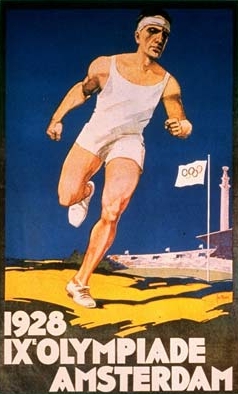
The 1928 Olympic games in Amsterdam were somewhat of an important moment in history and featured a lot of Olympic firsts.
On the top of the pile was it being the first Olympics that allowed women to enter track and field events. The first track and field women’s gold medallist was Halina Konopacka from Poland, who won the gold medal in discuss throwing. They were also the first to be called the “Summer Olympic Games” as the Winter Olympic Games had started 4 years earlier in 1924.
The Amsterdam was the first that saw an Olympic Flame, the first to be sponsored by Coca-Cola (the oldest Olympic sponsor), and the first to have all running events (apart from the Marathon) take place on a 400m track in an arena. It was the first Olympics which started the opening ceremony parade with athletes from Greece at the front and the host nation at the back (still done today). They were even the first to have a stricter schedule so all events took place within sixteen days rather than being spread out over months.
There were so many firsts! And so many which are still seen and treated as Olympic traditions in today’s games. I think it’s a shame Amsterdam didn’t get the 2028 Olympic games to celebrate the 100th anniversary of these games… it went to Los Angeles instead.
Another great fact is that because Amsterdam had so few car parking spaces they had to provide loads more to accommodate the Olympics. They used a blue sign with a white “P” on it. This became – and can still be seen today- the international sign for parking.
The first games in Asia
The 1964 Olympic Games in Toyko were the first games to take place in Asia. It was also the first to be telecast… though we know this better as being called televised. You know what, I’m making it sound more difficult than it needs to be. The 1964 Olympic Games were the first to be televised. Before 1964 the Olympics had been recorded live and then the tapes had to be sent worldwide. They were also showing off as well, as there were some elements of colour in the broadcasts as well- but that was only in Japan itself.
The games in 1964 took place in October to avoid the summer heat and typhoon season – a typhoon is just another name for a hurricane and had 163 medal events taking place in it. The famous Japanese Shinkansen railway network (the Bullet Trains) opened on the 1st October of 1964 so getting to and from the games was given an extra level of glamour. They left the opening to the last minute though. Better late than never I suppose.
The games in Toyko were the last that used cinder running tracks as synthetic athletic tracks came in from 1968 and beyond. Synthetics are more agile and can be used in all weather conditions. I suppose it’s the astroturf version of an athletic field.
Interestingly, Zambia declared independence on the final day of the 1964 Olympic Games becoming the first (and only I believe) country to arrive at the Olympic Games as one country and leave as a different one. (Northern Rhodesia to Zambia). They were the only team to use a placard in the closing ceremony.
The Olympics returned to Japan in 2021 … which was technically the 2020 Olympics. So Toyko is the only Asian city to have hosted the Olympics twice.
2000
The first games to be held in the new millennium were held in the year 2000 in Sydney, Australia. On a personal level, these are the first games I can properly remember (I would have been 9 at the time… gosh I’m old). They were the first to contain 300 events.
The 2000 games are remembered for being exceptionally well organised. They also served as the big inspiration for the team that put together London’s bid for the 2012 Olympics. The games will return to Australia in 2032 so expect big things!
The Olympic Stadium in Syndey is where England won the Rugby Union World Cup three years later in 2003.
From Syndey, the Olympics moved to Athens in 2004 (great video game attached it, if you were looking for some old school videogames), to Bejing in 2008 to London in 2012 (literally the longest period of no rain the UK has ever had during these Olympics) before heading, for the very first time, to South America.
The first South American games
The 2016 Olympic Games in Rio were the first to be held in South America. It was also only the third city to host the games in the Southern Hemisphere (after Melbourne and Syndey). 2016 was the first time the games had been held in a Portuguese-speaking country as well.
Because of the heat in Brazil during the summer months, these were the first Olympic Games to be held completely in the host nation’s winter period.
It was in these Olympics that the USA won their 1000th Summer Olympic Games medal. (UK are on 975 total at the time of writing) It’s only the USA, Germany and Russia (including all the Soviet Union medal wins) as countries that have won a combined medal total of over 1000.
After the Olympic Games in Paris, the Olympic Games will be going to Los Angeles in 2028 and then Brisbane in 2032. After that, we don’t know yet.
I, for one, hope the Olympic Games continue for many years to come.
What to read next
If you have enjoyed this blog about the Modern Olympic Games then here are others I recommend you read next.
